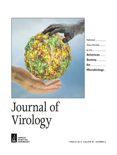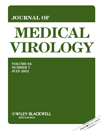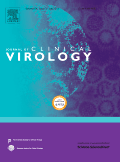
ANTIVIRAL RESEARCH
Scope & Guideline
Transforming Understanding of Viral Challenges
Introduction
Aims and Scopes
- Antiviral Drug Development:
Research dedicated to the identification and characterization of new antiviral agents, including small molecules, monoclonal antibodies, and vaccines, aimed at various viral infections. - Viral Pathogenesis and Immunology:
Investigation into the mechanisms of viral replication, host interactions, and immune responses to viral infections, providing insights that inform therapeutic strategies. - Vaccine Research and Development:
Studies focused on the design, efficacy, and safety of vaccines against viral pathogens, including innovative delivery systems and adjuvants. - Genetic and Molecular Virology:
Research on the genetic and molecular basis of viral pathogenesis, including studies on viral genome structure, replication mechanisms, and resistance to antiviral agents. - Clinical Research and Epidemiology:
Studies that evaluate the clinical outcomes of antiviral treatments and the epidemiology of viral infections, providing data to guide public health interventions. - Emerging and Re-emerging Viral Infections:
Research targeting newly identified viruses and variants, emphasizing the importance of surveillance and rapid response to emerging viral threats.
Trending and Emerging
- COVID-19 and SARS-CoV-2 Research:
A surge in studies related to SARS-CoV-2, including vaccine development, therapeutic interventions, and understanding viral mutations, has become a dominant theme following the pandemic. - Host-Directed Therapies:
Research on targeting host factors to inhibit viral replication is emerging as a promising strategy, showcasing the potential of host-directed antiviral therapies. - mRNA Technology in Antiviral Vaccines:
The success of mRNA vaccines against COVID-19 has sparked interest in using mRNA technology for other viral infections, leading to innovative vaccine designs. - Broad-Spectrum Antivirals:
Increased focus on developing agents that can target multiple viruses or viral families, driven by the need for preparedness against future pandemics. - Nanotechnology in Antiviral Applications:
Emerging use of nanotechnology for drug delivery systems and vaccine platforms is gaining traction, enhancing the efficacy and reach of antiviral therapies. - Artificial Intelligence in Drug Discovery:
The application of AI and machine learning in identifying potential antiviral agents and understanding viral-host interactions is becoming increasingly prevalent.
Declining or Waning
- Traditional Antiviral Agents:
Research on older antiviral drugs has diminished, as the field shifts focus towards novel therapeutics and combination therapies that address resistance issues. - Non-specific Immunomodulators:
Interest in broad-spectrum non-specific immunomodulatory agents appears to be waning, with a greater emphasis placed on targeted therapies and precision medicine approaches. - In vitro Studies with Limited Clinical Relevance:
There is a noticeable reduction in studies that rely solely on in vitro models without clear translational applications, as the field increasingly values research that bridges laboratory findings with clinical outcomes. - Viral Resistance Mechanisms:
While still important, the frequency of publications specifically focused on mechanisms of resistance in established antiviral therapies has decreased, potentially reflecting advancements in understanding and addressing these issues.
Similar Journals

VIROLOGICA SINICA
Exploring the Complexities of Viral PathogensVIROLOGICA SINICA, published by KEAI PUBLISHING LTD, is a leading international journal dedicated to the field of virology. With an ISSN of 1674-0769 and E-ISSN of 1995-820X, this esteemed journal showcases cutting-edge research from 2006 to 2024, focusing on critical developments in Immunology, Infectious Diseases, Molecular Medicine, and Virology. As evidenced by its respectable positioning in the Q2 quartile of relevant categories and impressive Scopus rankings—such as Rank #20/80 in Virology—VIROLOGICA SINICA serves as an essential resource for researchers, professionals, and students aiming to deepen their understanding of viral pathogens and their impact on human health. While the journal does not currently offer open access, it remains an invaluable publication for those seeking to stay at the forefront of virology research. Its address is located at 16 Donghuangchenggen North St, Beijing, China, where it continues to foster academic excellence in the rapidly evolving landscape of virology.

Journal of Virology
Exploring the Frontiers of Viral ResearchJournal of Virology is a premier scholarly journal dedicated to advancing the field of virology, focusing on the molecular mechanisms of virus-host interactions, viral pathogenesis, and the latest therapeutic and vaccine developments. Published by the American Society for Microbiology, this esteemed journal has been a cornerstone for researchers since its inception in 1967, providing a platform for high-quality, peer-reviewed research. With a commendable impact factor indicative of its relevance and influence, the journal is categorized in the top quartile (Q1) for Virology, Microbiology, and Insect Science, reflecting its significance in these fields. Researchers can access a wealth of studies and findings that shape our understanding of viruses and their interactions with hosts, highlighting its role in both basic and applied sciences. Positioned in the United States, the Journal of Virology serves a global audience, ensuring that cutting-edge discoveries reach professionals, students, and academics alike. Join the conversation as we explore the complexities of virology and its implications for human health and disease.

Food and Environmental Virology
Pioneering Insights into Food Safety and Environmental SustainabilityFood and Environmental Virology is a distinguished journal published by SPRINGER, focusing on the intersection of virology, food science, and environmental health. With its ISSN 1867-0334 and E-ISSN 1867-0342, this journal stands out for its contributions to the understanding of viral pathogens affecting food safety and environmental sustainability. Operating from its esteemed location in New York, USA, the journal has made significant strides since its inception in 2009, with a converged publication period extending to 2024. It currently holds a commendable position within various categories, ranking Q3 in Epidemiology and Virology and Q2 in both Food Science and Health, Toxicology and Mutagenesis, indicating its crucial role in informing both research and policy in these fields. With impressive Scopus rankings—such as 82nd out of 389 in Food Science and 38th out of 148 in Epidemiology—Food and Environmental Virology continues to be a vital resource for researchers, professionals, and students committed to advancing knowledge and practices around food safety and public health. While it operates under a subscription model, the rigorous peer-review process ensures that only high-quality research is published, maintaining the journal’s integrity and relevance in the scientific community.

VIRAL IMMUNOLOGY
Transforming understanding of viruses and host immunity.Viral Immunology, published by Mary Ann Liebert, Inc, stands as a prominent journal dedicated to advancing the understanding of the interplay between viral infections and host immune responses. With a strong focus on immunology, molecular medicine, and virology, the journal provides a platform for the dissemination of high-quality research findings and innovative methodologies that could shape the future of these critical fields. Although it currently holds a Q3 rating across its relevant categories and a respectable ranking within the Scopus database, Viral Immunology continues to strive for excellence with a commitment to publishing influential research that informs both academic and clinical practices. The journal accepts submissions in various formats—original research, reviews, and commentaries—catering to a diverse readership that includes researchers, professionals, and students engaged in the biological and medical sciences. Readers can anticipate insightful articles that address urgent challenges in immunological responses to viral infections, paving the way for new therapeutic strategies and public health initiatives.

VIROLOGIE
Unraveling the mysteries of infectious diseases.VIROLOGIE is a prominent international journal dedicated to advancing the field of virology and infectious diseases, published by John Libbey Eurotext Ltd. Since its inception in 1997, this journal has provided a platform for researchers and professionals to disseminate their findings on various aspects of virology, including the pathogenesis, epidemiology, and treatment of viral infections. Despite its current ranking in Q4 for both Infectious Diseases and Virology categories, the journal remains a valuable resource for emerging research and novel insights. The ISSN for the journal is 1267-8694, and it is based in France. VIROLOGIE is committed to upholding rigorous academic standards and fosters an inclusive scholarly community, making it an essential read for those pursuing knowledge and advancements in the ever-evolving landscape of virology. While the journal does not currently offer open access options, it continues to contribute significantly to the global discourse on viral research through its diverse range of published studies.

ARCHIVES OF VIROLOGY
Unveiling the complexities of viral diseases.Archives of Virology is a prestigious academic journal dedicated to the field of virology, published by Springer Wien. Established in 1975, this journal has been a crucial platform for disseminating innovative research findings and advancements in the understanding of viral diseases and their impact on human health. It holds a notable position in the academic landscape, with a 2023 impact factor placing it in Q2 within the field of Medicine (miscellaneous) and Q3 in Virology. Its Scopus ranking within the Virology category further underscores its relevance, with a notable percentile of 45th. Although it does not provide Open Access options, the journal's rigorous peer-review process ensures the highest quality of published work, making it an essential resource for researchers, professionals, and students aiming to stay updated in the rapidly evolving field of virology. For those committed to advancing their understanding of viruses and viral diseases, Archives of Virology is a vital scholarly resource.

JOURNAL OF MEDICAL VIROLOGY
Exploring Viral Frontiers: Unraveling the Complexities of Infectious Diseases.JOURNAL OF MEDICAL VIROLOGY is a prestigious academic publication dedicated to advancing the field of virology and infectious diseases. Published by WILEY, this journal has established itself as a cornerstone within the scientific community since its inception in 1977, and it will continue to provide cutting-edge research until 2024. With an impressive impact factor that places it in the Q1 quartile for both Infectious Diseases and Virology, the journal ranks 14 out of 344 in Medicine - Infectious Diseases and 6 out of 80 in Immunology and Microbiology - Virology according to Scopus metrics. Its focus encompasses a broad spectrum of topics, including viral pathogenesis, diagnostics, treatment strategies, and epidemiology, making it an essential resource for researchers, clinicians, and students alike. Although not an open-access journal, it provides valuable insights and accessible content for subscribers and libraries. The ongoing commitment to high-quality peer-reviewed articles makes JOURNAL OF MEDICAL VIROLOGY a vital platform for disseminating knowledge and fostering innovation in virology and related fields.

JOURNAL OF CLINICAL VIROLOGY
Unveiling Breakthroughs in Clinical VirologyJournal of Clinical Virology, published by Elsevier, stands at the forefront of virology research, focusing on the clinical implications of viral diseases. With an impressive impact factor representative of its Q1 categorization in both Infectious Diseases and Virology, this journal is essential for researchers and healthcare professionals aiming to keep pace with evolving knowledge and treatments in virology. Since its inception in 1998, it has provided a vital platform for the dissemination of significant breakthroughs, now continuing through to 2024. The journal boasts competitive Scopus ranks, placing it in the 95th percentile for Infectious Diseases and the 91st percentile for Virology. Scholars can benefit from its selective Open Access options, promoting widespread access to cutting-edge research. With an ever-increasing demand for innovative solutions to viral infections, Journal of Clinical Virology remains dedicated to fostering advancements in the field, making it a key resource for anyone invested in virology and infectious disease management.

JOURNAL OF GENERAL VIROLOGY
Illuminating the path of viral discovery and innovation.The JOURNAL OF GENERAL VIROLOGY, published by the Microbiology Society, is a premier academic journal dedicated to advancing the field of virology. Established in 1967, this influential journal covers a wide spectrum of research from basic virology to applied studies, serving as a vital resource for researchers, professionals, and students alike. With its ISSN 0022-1317 and E-ISSN 1465-2099, the journal is recognized for its rigorous peer-review process and high-quality publications, attaining a commendable Q2 ranking in the Virology category for 2023. The journal's focus on disseminating innovative findings and fostering critical discussions contributes significantly to the understanding of viral mechanisms, disease processes, and potential therapeutic strategies. Although it does not currently offer Open Access options, the journal remains accessible to the academic community, with a strong commitment to supporting virology research globally. As part of Scopus' top-tier rankings, illustrating its impact within the category of Immunology and Microbiology, the JOURNAL OF GENERAL VIROLOGY continues to play a pivotal role in shaping the future of virological science.

Virology Journal
Unlocking the mysteries of viruses for a healthier tomorrow.Virology Journal, published by BMC, stands as a prominent open-access platform since 2004, dedicated to advancing the field of virology and infectious diseases. With its E-ISSN: 1743-422X, this journal is based in the United Kingdom and strives to disseminate high-quality research that enhances our understanding of viral pathogens and their interactions with hosts. Recognized with a Q1 classification in the category of Infectious Diseases and a Q2 in Virology for 2023, Virology Journal holds significant standing in the academic community, ranking #82/344 in Medicine - Infectious Diseases and #26/80 in Immunology and Microbiology - Virology. Its commitment to open access ensures that cutting-edge research is freely available to researchers, professionals, and students worldwide, fostering collaboration and innovation in the fight against viral diseases. The journal aims to publish original research articles, reviews, and commentaries that will stimulate discourse and spark new ideas within the virology community.